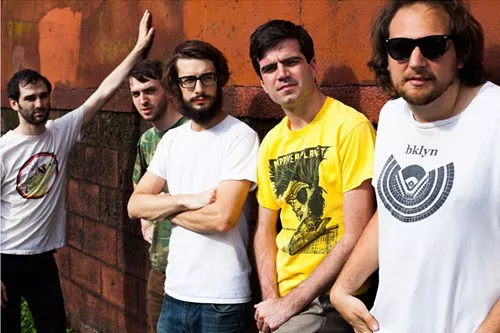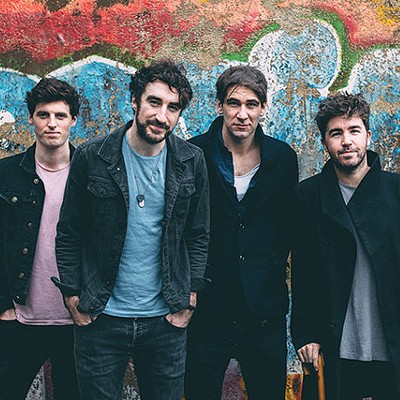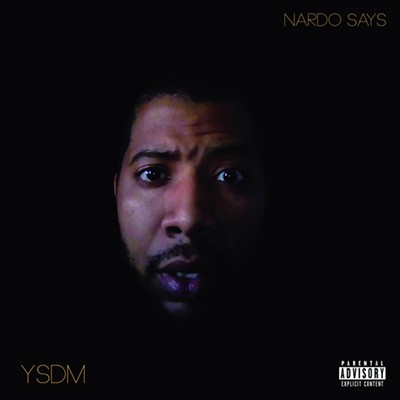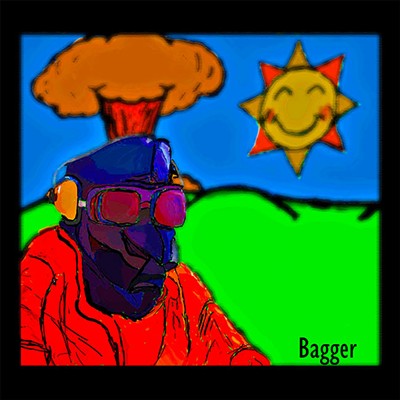Thursday, November 14, 2013
"For now, I choose the life of screaming": Q&A with Patrick Stickles of Titus Andronicus

- Photo courtesy of Kyle Dean Reinford
- Titus Andronicus (Patrick Stickles, second from right)
Titus Andronicus on paper may seem at odds with Titus Andronicus in action. Never shy about self-reference (see "Titus Andronicus vs. The Absurd Universe"), high-mindedness (see "Upon Viewing Bruegel's 'Landscape With the Fall of Icarus'"), or tongue-in-cheek commentary (see http://titusandronicus.net: Specializing in punk solutions since 2005), the band makes plain that its output is not reflexive or off-the-cuff, but conceptual, a pilot program for a still-forming worldview. Its last two albums explored the Civil War and the eco-system of the local music scene, respectively. Despite the philosophical underpinnings, the music is pure punk in execution: frenetic and lively. Titus Andronicus shows no willingness to reconcile inherent contradictions and no sign of abandoning grandiose ambitions. In fact, the band's next album will be a rock opera, the most grandiose of rock offerings. In this interview, frontman Patrick Stickles talks about the medium and the message.
Your songs tend toward big, existential ideas. Do you ever feel stifled by the limitations of your medium, as though the themes you deal with in your songs might be better explored through media such as fiction or film?
While it may be true that rock 'n' roll cannot traditionally allow the level of detail and explication of ideas that some other formats can offer the artist, it has one major advantage over, say, a book or something: A book can be easily put aside and ignored by the idle student, but a rock 'n' roll band, at its best, is impossible to ignore, and engages the audience in a more confrontational and visceral manner. Words on a page can beckon an eager mind, but rock and roll will shove its message down the throat of even the most ambivalent bystander. Books, paintings, these sort of things invite as rock 'n' roll attacks. In the same way, articulating a feeling on paper may allow greater clarity of expression, but it will be lacking in the catharsis of screaming those same feelings. The physicality of the act of rocking grants transcendent qualities to even the most crudely expressed feelings, tearing down the walls of apathy the listener may put up around themselves so that essence of these feelings, as articulated (however crassly) by the artist may touch the primal oneness within.
That being said, all this screaming and getting in people's faces and the ceremonial endurance of all the loud noises, is easy to turn on and off like a faucet (easy to turn on, anyway), but as the artist gets older, the practicality of less physically demanding mediums of expression grows in its appeal. As I get to be an old man, I can see why certain creative types would find it preferable to spend a year writing a book, maybe with a nice cup of tea in hand, than spend that same year screaming. Also, the price of finding the right place to do all that screaming may be greater than finding a place to put a desk. For now, I choose the life of screaming.
It is important to remember through all this, though, that while we may find it appropriate to try to achieve certain artistic ends with an album that other artists may find more suited to a novel or film, all of that stuff is secondary to the real essential element of rock 'n' roll's appeal, which is the toe-tapping element, the jumping up and down part of it, the part of it that touches the Dionysian and the Bacchanal. Rock 'n' roll having this element separates it from other art forms, but it does not deny it the same hifalutin' ambitions that a painting or a novel may have. The trick is making it work on both levels, so that it may satisfy a sweaty throng on a Saturday night who want nothing more than to connect with their animal nature, or a desperate loner on a Wednesday morning who seeks validation and understanding. It is the same trick we humans must play, balancing the cerebral and the carnal impulses that are forever at war within ourselves. Rock 'n' roll, at its best, will please both ape and ubermensch.
Each Titus Andronicus album seems to have a thematic through line. Do you find taking a thematic approach makes for an unwieldy creative experience, or does it lend a sense of structure?
During the songwriting process up to this point, it is not that I have purposefully catered the songs to adhere to the parameters of the project, but that the parameters of the project have been kept loose enough to allow for me to freely follow the muse. The moment of creation validates the work from birth — it would be foolish to reject something that feels right because it doesn't fit into some predetermined scheme. The particulars of the scheme are established much later, with the disparate pieces of work as evidence of the larger picture.
If anything, the larger concept of the rock opera offers me answers that can reached somewhat logically which I would not have at hand if trying to simply write three perfect minutes of rock. A three minute rock song as a completely blank canvas seems like a lot of freedom, but for me it can mean a lot of hand wringing, as one way to move forward is as empirically “good” as a million others — should I play G then C, or G then D? “Oh baby” then “yeah” or “yeah” then “oh baby?” Having even the vaguest of over-arching themes or goals eliminates a lot of guesswork sometimes.
As you've alluded to, you've said your next album will be a rock opera. How close will it stick to a proper narrative?
The rock opera we are working on now will follow a narrative across five acts, but it is more of an allegory or a fable rather than “This is the story of so and so who performs actions x, y, and z, and then this other one does this.” Our hero sings more about what it feels like in a succession of moments than a laundry list of events advancing the plot forward. If in one part of the story, our hero is sad, he sings about being sad. When he becomes happy, he sings of happiness. It is more a plot like that than, “...and then a thousand starfighters appeared and they all fired their lasers and yadda yadda.”
The rock opera you are working on was inspired by your own experiences with manic depression. Have friends and loved ones urged caution in the level of autobiography you put onto the album?
As far as the level of autobiography in the rock opera, the important people in my life know better than to advise me towards making art which is “safer.” I have told most of my secrets already in previous Titus Andronicus songs, which were all autobiographical, but the rock opera is a work of fiction and not autobiography. That is not to say that all the things which happen to our hero did not happen to me, but the hero of the rock opera is not necessarily me, and he should not be thought of as such, anymore than Hamlet is Shakespeare, not to compare myself.
Do you have a vision for what you'd like the Titus Andronicus canon to look like when you're done? Are you working from a playbook set forth at the beginning of the Titus Andronicus run?
I cannot claim that every movement of Titus Andronicus up to this point has been a piece of a larger, unified scheme. When I started the band, I was just a dumb kid doing whatever and making a mess. Now that I am an adult, and the person responsible for this body of work, even if the person who made it means as much now as a snake's last molted skin, it now falls on me to contextualize the things we have done in the past, reconcile them with the sort of artist I want to be now, and create work which will act as a sort of glue between what we have done, making connections between the pieces and trying to create a larger picture which will be more than the sum of its components.
In much the same way as I cater the structure of the rock opera to accommodate its disparate pieces, so too must the work we do now suggest a context which allows for that which has come before to coexist and reveal itself as part of a process of growth and development. With each new release, you come, hopefully, a step closer to achieving your artistic ideal, and as a more perfect realization is achieved, the seeds of it come to reveal itself in that which came before. The artist always has had a vision, but could never communicate it truly, could never liberate it from its cerebral prison, but can only present the best possible articulation of it at that time.
As the body of work grows, the artist is able to present a clearer and clearer vision of his or her or their ideal of artistic goodness, and the listener can take their own understanding of that ideal and bring it to the earlier work, more able to forgive youthful weakness of expression and see the essence, almost see into the mind of the artist. It is in the mind that the great work is done — all these artistic forms just faulty mirrors.
Tags: Titus Andronicus , Patrick Stickles , FFW>> , Image














